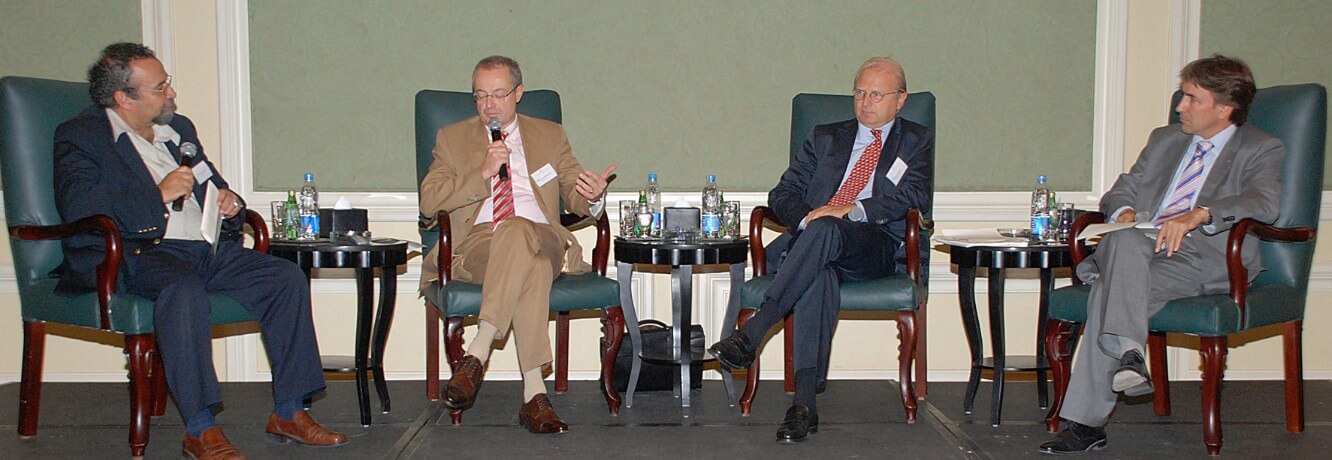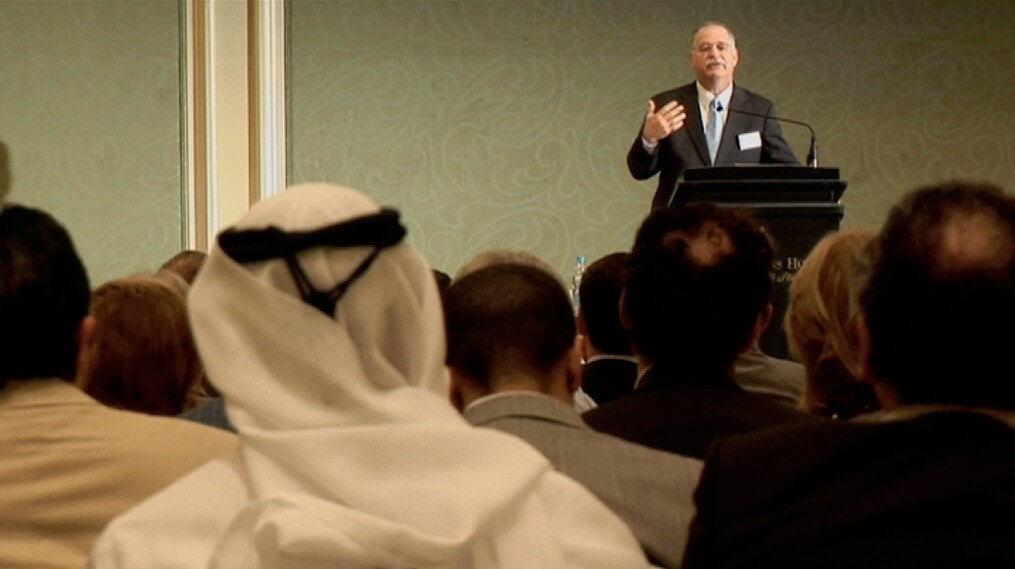A successful business must be aware of the market opportunities, challenges and complexities that exist. This is just as true for a family company. A strong foundation and constitution is vitally important not only for the senior family members, often the owners, but also for the younger generations”, writes Khalid Mohamed Kanoo, patron of this year’s Arab-German Family Business Summit in his welcoming address. But how can the foundation and constitution of modern family businesses be supported and protected? And how do different cultural backgrounds define the type of support required? These are questions that Timm Tiller and Paul Dietze, founders of the International Institute for Family Enterprises (IIFE) at Witten/Herdecke University in Germany ask in their article. The answer seems short: the broadening of knowledge through research and the dissemination of findings through education, embedded in an institutional framework.
Over centuries, questions concerning family businesses were answered within family circles, and heads of families made decisions by relying on their economic intuition, intellect, and business experiences. However, in recent decades it has become apparent that the scientific analysis of issues concerning family businesses is necessary to facilitate both the progressive management of success models, and solutions to threats faced by family businesses. In order to secure the future of these businesses over several generations, knowledge regarding family businesses should be broadened and a methodical search for insight should be implemented.
For a long time, the focus of business and economic studies has been on areas such as the financial sector, publicly held enterprises, and international corporations. Consequently, a significant body of academic knowledge currently exists in these fields. Until some decades ago, family businesses and related areas remained virtually unexplored. This goes against the generally accepted notion that family businesses are highly relevant and important contributors to most economies. According to Prof. Fritz Simon of the WIFU (Witten Institute for Family Business), family businesses form the “spine of modern economics” due to the fact that they represent a large percentage of the total number of enterprises in a country. Furthermore, participants of a study regarding the image of German family businesses at the WIFU attribute family businesses with “ideal employers”, as “representing the ideal entrepreneurship”, and “being of personal importance”.
Family businesses enjoy many advantageous qualities relative to other forms of businesses. These include a focus on longevity and values, the pursuit of mostly conservative monetary policies, financial independence, the ability to take on business risks, the use of family-based networks, a higher awareness of employee needs, and innate benefits such as family bonds, trust, and loyalty. However, these qualities only remain valid so long as family businesses avoid pitfalls such as family disputes and the loss of trust among family members.
Taking an academic approach, family businesses must be differentiated based on their age. In Germany and other European countries, many family businesses look back on an eventful history due to a long industrial past. Amongst them illustrative examples is, for instance, the Prym family, which has been a business operation for 19 generations. Another one is the Bahlsen family, which launched its business in 1889. The important considerations for such families are different from those relevant to family businesses that are operating, for example, in their third generation, as many Arab family businesses are. Research as to these younger family businesses facilitates the discovery of new perspectives. In studying younger family businesses, it is possible to systematically demonstrate problems emerging at business formation and illustrate how these problems can be confronted and overcome.
Furthermore, family businesses in the Arab world must be looked at differently as it is not only the age of a company, but also the cultural background that differentiates them from Western family businesses.
The Arab world is a region comprising emerging economies and numerous family businesses. German research questions and method designs, for instance, cannot simply be transferred to the Arab world. Even though family businesses all over the world have, by definition, many similarities, there are unique questions that arise particularly in the Arab world. So even if keywords like succession planning, family constitution, and value orientation are understood, the arguments and mechanisms behind them differ profoundly depending on the culture, legal framework, and geographical location of a country. So the need for studies in the Arab world results from the different histories of these companies, and from the different problems and issues occurring because of their different cultural backgrounds.
In order to expand knowledge in this field, individual qualitative studies of current problems as well as quantitative research long-term studies are advisable. A pool of family businesses should be consecutively examined on the aspects of family structure, succession management, economic development, and corporate governance. An initial study by the IIFE was carried out in the course of the first Arab-German Family Business Summit that took place in Cairo in 2008. 50 interviews were conducted to determine the prestige attached to the brand “family business” in Egypt, and answers were compared with results from previous German studies. In both countries, family businesses play an important societal role and contribute greatly to economic development. But the survey also showed that it would be important for Egyptian family businesses to strive for a higher level of professionalism, corporate transparency, and compliance to international standards in order to be considered a more attractive employer and in strengthening the importance of the brand. On the other side, as John Davis from Harvard Business School points out, Arab family businesses play an important role in supporting the communities through sharing their economic prosperity, which can be both attributed to cultural and religious customs. These two aspects are illustrative of just a small insight as to the complex role and image of Arab family businesses in society. To highlight and explore more of the trends affecting Arab family businesses in the future, their problems, and issues, the IIFE will conduct the Arab Family Business CEO Study, to be completed in April 2011. The analysis will lay the groundwork in establishing a family business data pool for long-term studies. Numerous interviews with CEOs and managers from 15 different Arabic countries will hopefully not only shed light on important current topics, but also serve as a foundation for creating portraits of these businesses and their history. The presented studies will show the actual substance that comprises the topics of Arab family businesses. But these topics will not only be examined on a scientific basis; it is also of high importance to transfer the results into practice. In addition to family businesses profiting from the results, researchers can be provided the basis to identify and develop a nexus between their image and reality. It is therefore considerably beneficial for experts from academia and practice to come together and discuss their experiences and insight. In conclusion, the fundamental question of how to protect and support the foundation and constitutions of family businesses in order to maintain their beneficial role in society can be answered by identifying the importance of, and fostering the exchange between practice and research. Academic dedication can continue to support family businesses – through research, education, and exchange of knowledge – in such a way as to enable the next family business generations to remain the spine of modern economics.

The International Institute for Family Enterprises (IIFE) was founded in 2007 at Witten/Herdecke University in Germany as the international unit of the renowned Witten Institute for Family Business (WIFU). As the first institute of its kind, it has developed a network of leading Arab and German-speaking family businesses, conducts in-depth research on Arab family business topics, and offers executive education and strategic advisory services by international experts throughout the Arab World.
The key motivation behind establishing the IIFE was the founders’ conviction that an exchange of first-hand experience and in-depth knowledge among family businesses is of immense value at many levels, both in theory and in practice. A key driver for the exchange between the leading Arab and German-speaking family businesses is the yearly Arab-German Family Business Summit. In 2009, it will take place from 31 October through 1 November at the Ritz Carlton Bahrain, Hotel & Spa in Manama under the auspices of Khalid Mohamed Kanoo of Bahrain and Dr. Arend Oetker of Germany. Due to the current economic situation, the topic of this year’s summit will be “Family Businesses & the Economic Crisis”. The summit is tailored exclusively for family members and non-family executives of the most influential family businesses from Austria, Germany, Switzerland, and the Arab World. The opportunity to explore personal and business relationships in the quest to strengthen intercultural exchange is offered in workshops and conversation rounds, moderated by international academics from universities such as Harvard, Yale, and Princeton. Challenges such as structural changes that confront family businesses will be addressed and potential partnerships in the fields of financing and technology via individually organised face-to-face business talks will be offered.
Tharawat Magazine, Issue 4, 2009
















